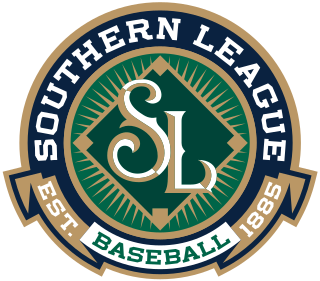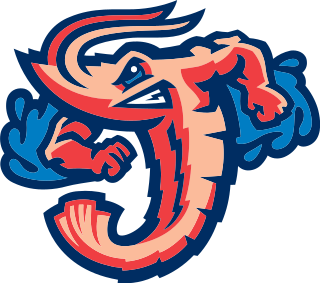
The National League Championship Series (NLCS) is a best-of-seven playoff and one of two League Championship Series comprising the penultimate round of Major League Baseball's (MLB) postseason. It is contested by the winners of the two National League (NL) Division Series. The winner of the NLCS wins the NL pennant and advances to the World Series, MLB's championship series, to play the winner of the American League's (AL) Championship Series. The NLCS began in 1969 as a best-of-five playoff and used this format until 1985, when it changed to its current best-of-seven format.
The American League Championship Series (ALCS) is a best-of-seven playoff and one of two League Championship Series comprising the penultimate round of Major League Baseball's (MLB) postseason. It is contested by the two winners of the American League (AL) Division Series. The winner of the ALCS wins the AL pennant and advances to the World Series, MLB's championship series, to play the winner of the National League's (NL) Championship Series. The ALCS began in 1969 as a best-of-five playoff and used this format until 1985, when it changed to its current best-of-seven format.

The Southern League is a Minor League Baseball league that has operated in the Southern United States since 1964. Along with the Eastern League and Texas League, it is one of three circuits playing at the Double-A level, which is two grades below Major League Baseball (MLB).

The Columbus Clippers are a Minor League Baseball team of the International League (IL) and the Triple-A affiliate of the Cleveland Guardians. They are located in Columbus, Ohio, and are named for speedy merchant sailing vessels known as clippers. The team has played their home games at Huntington Park since 2009. They previously played at Cooper Stadium from 1977 to 2008.

The Louisville Bats are a Minor League Baseball team of the International League (IL) and the Triple-A affiliate of the Cincinnati Reds. They are located in Louisville, Kentucky, and are named in dual reference to the winged mammal and baseball bats, such as those manufactured locally under the Louisville Slugger brand. The team plays their home games at Louisville Slugger Field, which opened in 2000. The Bats previously played at Cardinal Stadium from 1982 to 1999.

The Jacksonville Jumbo Shrimp are a Minor League Baseball team of the International League (IL) and the Triple-A affiliate of the Miami Marlins. They are located in Jacksonville, Florida, and are named for shrimp caught in the area. The team plays their home games at 121 Financial Ballpark, which opened in 2003. They previously played at Sam W. Wolfson Baseball Park from 1962 until the end of the 2002 season.

The American Association (AA) was a Minor League Baseball league that operated primarily in the Midwestern and South Central United States from 1902 to 1962 and 1969 to 1997. It was classified as a Triple-A league, which is one grade below Major League Baseball, for most of its existence.

The Indianapolis Indians are a Minor League Baseball team of the International League (IL) and the Triple-A affiliate of the Pittsburgh Pirates. They are located in Indianapolis, Indiana, and play their home games at Victory Field, which opened in 1996. The Indians previously played at Owen J. Bush Stadium from 1931 to 1996 and at two versions of Washington Park from 1902 to 1931.

The Omaha Storm Chasers are a Minor League Baseball team of the International League and the Triple-A affiliate of the Kansas City Royals. They are located in Papillion, Nebraska, a suburb southwest of Omaha, and play their home games at Werner Park, which opened in 2011. The team previously played at Johnny Rosenblatt Stadium from 1969 to 2010.

The Nashville Vols were a Minor League Baseball team that played in Nashville, Tennessee, from 1901 to 1963. Known only as the Nashville Baseball Club during their first seven seasons, they were officially named the Nashville Volunteers in 1908 for the state's nickname, The Volunteer State. The Vols played their home games at Sulphur Dell, which was known as Athletic Park until 1908.

The International League (IL) is a Minor League Baseball league that operates in the United States. Along with the Pacific Coast League, it is one of two leagues playing at the Triple-A level, which is one grade below Major League Baseball (MLB).

The Nashville Vols Minor League Baseball team played 62 seasons in Nashville, Tennessee, from 1901 to 1963; they were inactive in 1962 due to declining attendance and the Southern Association (SA) ceasing operations after 1961. Over 9,015 regular season games, the Vols compiled a win–loss record of 4,569–4,446 (.507). They qualified for postseason playoffs on 16 occasions and had a postseason record of 108–74 (.593). Nashville won eight SA pennants, nine SA playoff championships, and four Dixie Series titles. Combining all 9,197 regular season and postseason games, the Vols had an all-time record of 4,677–4,520 (.509).
The Major League Baseball postseason is an elimination tournament held after the conclusion of the Major League Baseball (MLB) regular season. Starting in 2022, the playoffs for each league—American and National—consist of two best-of-three wild-card playoffs contested by the worst-seeded division winner and the three wild card teams, two best-of-five Division Series (LDS) featuring the wild-card winners and the two highest-seeded division winners, and finally the best-of-seven League Championship Series (LCS). The winners of the American League Championship Series (ALCS) and the National League Championship Series (NLCS) play each other in the best-of-seven World Series. The current system allows for up to 53 postseason games and at least 32 games.

The Memphis Blues were a Minor League Baseball team that played in Memphis, Tennessee, from 1968 to 1976. They competed in the Double-A Texas League from 1968 to 1973 as an affiliate of the New York Mets. Memphis transferred to the Triple-A International League in 1974, where they were affiliated with the Montreal Expos from 1974 to 1975 and Houston Astros in 1976. Their home games were played at Blues Stadium












